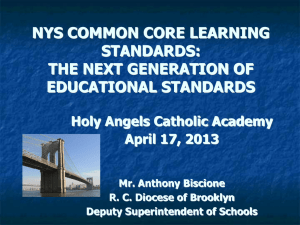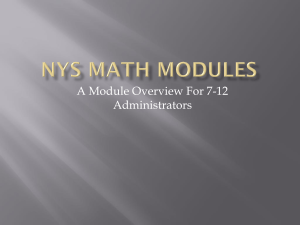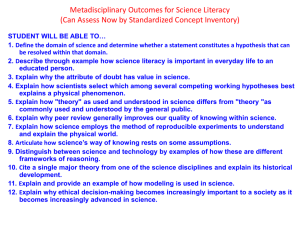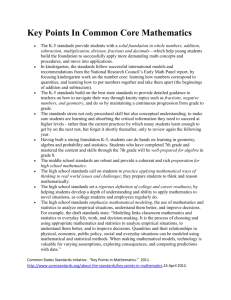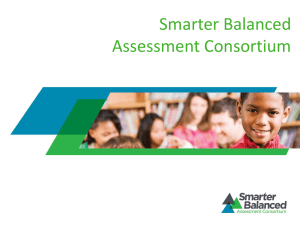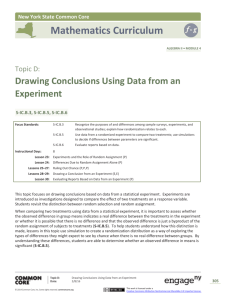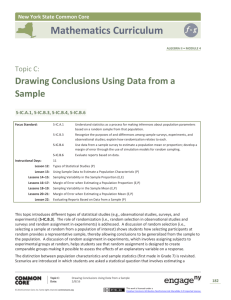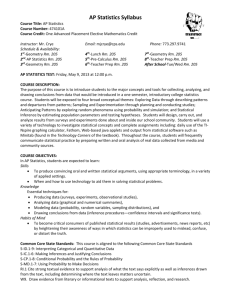File
advertisement
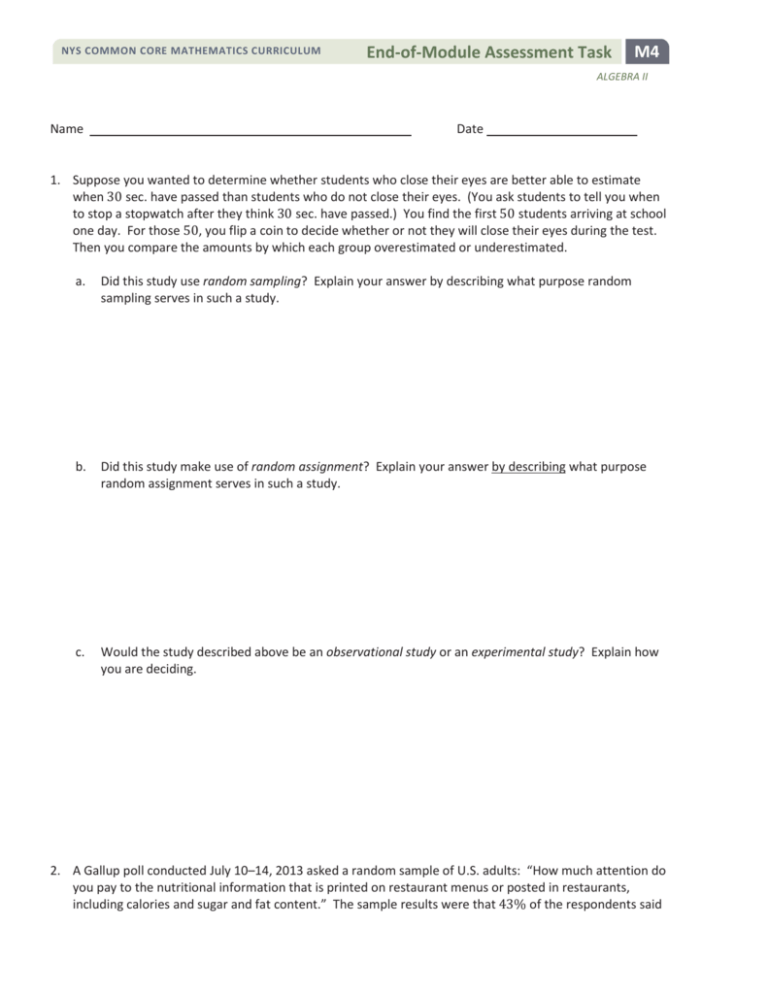
NYS COMMON CORE MATHEMATICS CURRICULUM End-of-Module Assessment Task M4 ALGEBRA II Name Date 1. Suppose you wanted to determine whether students who close their eyes are better able to estimate when 30 sec. have passed than students who do not close their eyes. (You ask students to tell you when to stop a stopwatch after they think 30 sec. have passed.) You find the first 50 students arriving at school one day. For those 50, you flip a coin to decide whether or not they will close their eyes during the test. Then you compare the amounts by which each group overestimated or underestimated. a. Did this study use random sampling? Explain your answer by describing what purpose random sampling serves in such a study. b. Did this study make use of random assignment? Explain your answer by describing what purpose random assignment serves in such a study. c. Would the study described above be an observational study or an experimental study? Explain how you are deciding. 2. A Gallup poll conducted July 10–14, 2013 asked a random sample of U.S. adults: “How much attention do you pay to the nutritional information that is printed on restaurant menus or posted in restaurants, including calories and sugar and fat content.” The sample results were that 43% of the respondents said NYS COMMON CORE MATHEMATICS CURRICULUM End-of-Module Assessment Task M4 ALGEBRA II they pay a “fair amount” or a “great deal” of attention. Suppose there had been 500 people in the study. The following graph displays the results from 1,000 random samples (each with sample size 500) from a very large population where 50% of respondents “pay some attention" and 50% “pay little or no attention.” sample proportion a. Based on the simulation results above, are the sample data (43% responding “pay some attention”) consistent with the simulation? In other words, do these results cause you to question whether the population is 50/50 on this issue? Explain. b. Do you believe it is reasonable to generalize the results from this study to all U.S. adults? Explain. NYS COMMON CORE MATHEMATICS CURRICULUM End-of-Module Assessment Task M4 ALGEBRA II Assessment Task Item Highly Effective: Effective: Developing: Ineffective: Gives a correct answer Gives a correct answer with Incorrect or Incorrect of with substantial some evidence of missing answer missing answer evidence of mathematical reasoning to but shows with little to no mathematical solve a problem evidence of some evidence of reasoning and OR mathematical mathematical implementation to Gives an incorrect answer reasoning and reasoning and solve a problem. with substantial evidence implementation of implementation of mathematical reasoning mathematics to of mathematics and implementation to solve the problem to solve the solve a problem problem Correctly states the Says the study did not use Confuses random Provides an study did not use random sampling sampling with other answer that is not random sampling BUT various random relevant to the AND Describes the purpose of forms like random statistical study Describes the purpose random sampling incorrectly assignment. given. statistical studies as attaining a (ex- to draw cause-and- and explains how representative sample. effect-conclusions) Correctly says the study Says the study did use Confuses random Provides an did use random random assignment assignment with answer that is not assignment BUT other various relevant to the AND Describes the purpose of random forms like statistical study Describes the purpose random assignment random sampling. given. in terms of balancing incorrectly (ex-only to draw out confounding cause-and-effect-conclusions variables. but with no explanation why a. 1. Recognize the purpose and S-IC.B.3 differences among randomization b. relates to each. S-IC.B.3 that works) c. S-IC.B.3 Identifies the study as Identifies the study as Identifies the study Answer shows experimental experimental as observational inconsistency with AND BUT AND/OR a choice between The justification is The reasoning is inconsistent The reasoning is the two types of correct. with the student’s choice. inconsistent with studies. the student’s choice. NYS COMMON CORE MATHEMATICS CURRICULUM End-of-Module Assessment Task M4 ALGEBRA II 2. Making a. Uses the observed Makes an attempt to Replies “no” Student does not statistic (0.43) and the integrate information from because the center refer to the simulated distribution the observed statistic and of the simulated simulated graph to address the the simulated distribution distribution is close distribution in parameter based question of whether the but the response is to .50. their response. on a random population is 50/50 (ex- inconsistent (ex- “.43 is on sample “Yes, because 0.43 is far the graph so I believe the in the tail of this population is 50/50) distribution”). OR Statistical Inference about a S-IC.A.2 populations Makes a conclusion that cannot be inferred (ex- We have proven that the population is 50/50) b. S-IC.A.1 Indicates the Gallup Poll Attempts to use random Replies “no” and Does not justify uses a random sample sampling in order to justify claims the sample is their answer. of U.S. adults to argue reasoning but is to with the too small that it would be suitable 43% being too different OR to generalize the results from 50%. Says only adults to the larger population were surveyed of U.S. adults. OR Claims that representing an entire population is impossible
